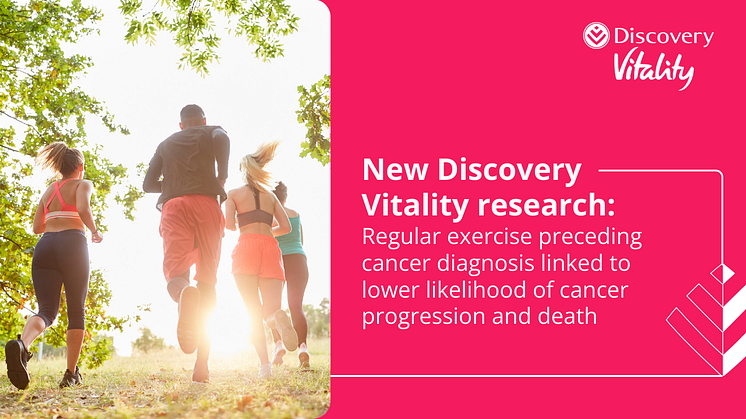
Press release -
New Discovery Vitality research: Regular exercise preceding cancer diagnosis linked to lower likelihood of cancer progression and death
Johannesburg, January 29, 2025– Engaging in regular physical activity before a cancer diagnosis can significantly reduce the risk of cancer progression and mortality, according to new research published in the British Journal of Sports Medicine. The study, conducted by Discovery Vitality in partnership with researchers from Wits University and the University of Western Ontario, highlights the critical role of physical activity in cancer progression and survival.
The groundbreaking study retrospectively analysed data from 28,248 individuals with stage 1 cancer, examining their levels of physical activity prior to diagnosis.
Moderate to high physical activity (60 or more minutes per week) compared to no activity in the year preceding the diagnosis of cancer was associated with:
- 27% lower risk of cancer progression.
- 47% lower risk of death from any cause.
Low physical activity (less than 60 minutes per week) compared to no activity in the year preceding the diagnosis of cancer showed:
- 16% lower risk of cancer progression.
- 33% lower risk of death from any cause.
Dr Mosima Mabunda, Head of Wellness at Discovery Vitality, noted: “This research provides strong evidence that physical activity should be a key component of cancer care, before and after diagnosis. Exercise not only helps reduce the risk of developing cancer but also improves survival outcomes, making it a powerful tool in managing the disease.”
Professor Jon Patricios from Wits University, one of the study’s co-authors, added, “The findings from this study are truly groundbreaking. They show that exercise is not just beneficial for reduced cancer risk but can also significantly improve outcomes for those diagnosed with cancer. Encouraging physical activity among those at a high risk for cancer development should be a priority for healthcare providers.”
The global cancer burden
Cancer remains a leading cause of premature death globally, with approximately 1 in 5 people expected to develop the disease in their lifetime. According to the World Health Organization (WHO), cancer was responsible for 9.7 million deaths worldwide in 2022. In South Africa, the situation is equally concerning, with the National Cancer Registry (NCR) reporting that the lifetime risk of developing a cancer is 1 in 8 females and 1 in 6 males.
The preventable nature of many cancers highlights the importance of lifestyle interventions. It is estimated that 30–40% of cancers could be prevented by addressing environmental and modifiable risk factors such as physical inactivity, smoking, poor dietary habits, and obesity. These same factors not only influence the risk of developing cancer but may also impact cancer progression, recurrence, and mortality.
The study’s findings reveal that the benefits of physical activity are long-lasting. Five years after a cancer diagnosis, individuals who were physically active before their diagnosis had significantly lower rates of cancer progression compared to those who were inactive.
Dinesh Govender, CEO of Discovery Vitality, commented, “Our core purpose at Discovery Vitality is to enhance and protect people’s lives, and this research strongly supports the value of physical activity in cancer care. People who build a habit of regular physical activity are more resilient, which is why we prioritise incentivising exercise through our programmes. It’s heartwarming to know that the work we do at Discovery Vitality makes a meaningful difference in improving survival rates and quality of life for cancer patients.”
Implications for public health
This research adds to the growing body of evidence that physical activity is a vital component of public health strategies. By prescribing exercise, healthcare providers can help reduce the burden of cancer and improve outcomes for those diagnosed with the disease.
Discovery Vitality champions initiatives that help individuals develop a habit of regular physical activity, recognising its critical role in disease prevention and management. The findings from this study show the importance of incorporating exercise into cancer care protocols and public health recommendations.
For individuals, this serves as a powerful reminder of the health benefits that even modest levels of exercise can bring.
To support this, Discovery Vitality offers a variety of incentives including 75% off gym memberships, rewards for being active each week through Vitality Active Rewards, and up to 50% off on the latest fitness devices and active gear – among other initiatives. Members can also join a parkrun or participate in the Vitality Run Series and earn points, making physical activity both accessible and rewarding.
For more information, read the full published paper here: https://discv.co/CancerResearch
Topics
Categories
Discovery information
About Discovery
Discovery Limited is a South African-founded financial services organisation that operates in the healthcare, life assurance, short-term insurance, banking, savings and investment and wellness markets. Since inception in 1992, Discovery has been guided by a clear core purpose – to make people healthier and to enhance and protect their lives. This has manifested in its globally recognised Vitality Shared-Value insurance model, active in over 40 markets with over 40 million members. The model is exported and scaled through the Global Vitality Network, an alliance of some of the largest insurers across key markets including AIA (Asia), Ping An (China), Generali (Europe), Sumitomo (Japan), John Hancock (US), Manulife (Canada) and Vitality Life & Health (UK, wholly owned). Discovery trades on the Johannesburg Securities Exchange as DSY.
Follow us on Twitter @Discovery_SA
About Vitality
Vitality is the largest global platform for behaviour change, underpinning the insurance products of leading insurers worldwide, impacting 30 million lives in over 40 markets. The Vitality model, established by Discovery Limited in South Africa, has been incentivising behaviour change among its clients for over 25 years. Vitality creates shared value by combining behavioural economics, clinical science, and financial incentives to encourage and reward members for taking steps to improve their health. The model began with a focus on health and wellness and has expanded to include short-term insurance, investments, and financial wellness.


